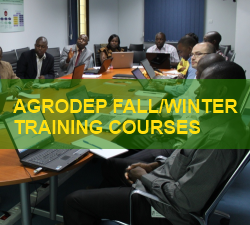 As part of its mission to help African experts take a leadership role in the development and agricultural growth and policy debate facing African countries, AGRODEP offers a series of training courses to its members. These courses cover data, modeling, impact evaluation and econometrics, among many other topics. The training program series allows AGRODEP to support young scientists, upgrade the skills of Consortium members, and promote technical and methodological innovation to ensure that the Consortium remains a world class entity. The 2012 AGRODEP training courses will continue in the fall with one course in September and two in October. Panel Data Econometrics will be held on September 24-28, Household Surveys Data: Sampling and Processing on October 8-10, and Impact Evaluation & Analysis of Development Interventions on October 29-31. Members’ attendance is limited to two (2) training courses per year. Participants will be selected based on their individual backgrounds and their motivations for applying to a specific course.
As part of its mission to help African experts take a leadership role in the development and agricultural growth and policy debate facing African countries, AGRODEP offers a series of training courses to its members. These courses cover data, modeling, impact evaluation and econometrics, among many other topics. The training program series allows AGRODEP to support young scientists, upgrade the skills of Consortium members, and promote technical and methodological innovation to ensure that the Consortium remains a world class entity. The 2012 AGRODEP training courses will continue in the fall with one course in September and two in October. Panel Data Econometrics will be held on September 24-28, Household Surveys Data: Sampling and Processing on October 8-10, and Impact Evaluation & Analysis of Development Interventions on October 29-31. Members’ attendance is limited to two (2) training courses per year. Participants will be selected based on their individual backgrounds and their motivations for applying to a specific course.
The course on Panel Data Econometrics will be taught by Dr. Rembert De Blander from the Public Economics research unit at KU Leuven, Belgium. The course will touch on important issues in panel data modeling and estimating, focusing on the underlying rationale and examining implementation possibilities including open source software. The course will also provide an overview of panel data models using Stata examples and give a theoretical exploration of recent panel data material. The application process for this course is now closed.
The course on Household Surveys Data: Sampling and Processing will be taught by Dr. Carlo Azzarri and Ms. Melanie Bacou from the International Food Policy Research Institute. The course aims to fill the gap in knowledge that exists regarding household samples, from survey organization and design to the final output of a paper, set of simulation or impact analysis results, or visualization. Participants will receive a detailed overview of the key phases and concepts that comprise multi-topic household survey data collection. By the end of the course, participants should be familiar with the general procedures involved in collecting survey data using applications in Stata. The application process for this course was recently opened and will be open until August 24.
The course on Impact Evaluation & Analysis of Development Interventions will be taught by Dr. Tanguy Bernard of the International Food Policy Research Institute. The course will focus on preparing African researchers to be more heavily involved in impact evaluation studies in Africa through hands-on training regarding the theory, practice, and issues surrounding impact evaluations. The course will specifically address selection bias and causality, various approaches to impact evaluation, and stata-based design and computing. The application process for this course will be opened soon and will remain open until August 31.